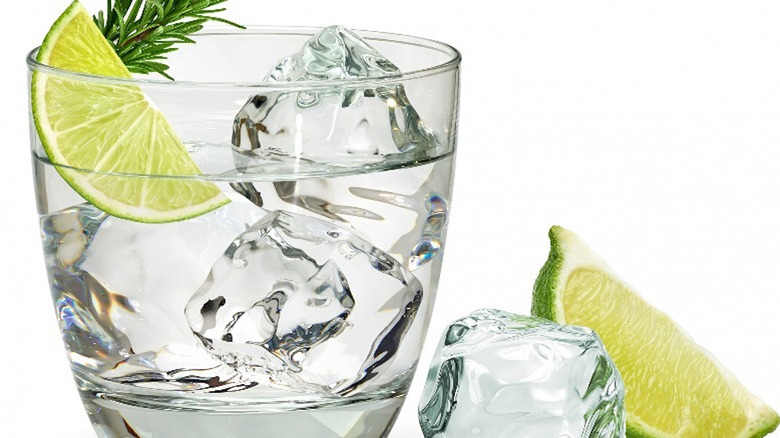The Reason You Should Never Skimp Out On Ice For Gin And Tonics
Most people would consider ice a necessary evil when it comes to the perfect gin and tonic. Everyone wants their cocktail to be cold and refreshing, but no one wants a watered-down drink, which is a common fear when there's too much ice. However, that preconceived notion may be slightly more incorrect than initially thought. A tiny bit of dilution can be appropriate, specifically when melding all the flavors within your beverage. As a result, although it may sound counterintuitive, don't leave out the ice when crafting a great gin and tonic. Quite the opposite; the more ice, the better, so feel free to pile those frozen cubes into your favorite cocktail glass.
Granted, there's no way to stop dilution — it will happen whether you like it or not — but the rate at which it occurs can be controlled. It comes down to the size of the ice in your glass and how it interacts with the spirit.
Ice melts, but at different rates
Ice dilution is a fact of life, but critical to chill your drink. For instance, the ice itself doesn't cool down your beverage; the conduction of heat through the liquid surrounding the surface of the ice, which causes it to melt, brings the temperature down. This circumstance may be why most think larger ice means more significant surface area and better cooling, but that isn't the case. A more extensive exterior transmits heat quicker, so smaller cubes work better, and adding as much as possible is the goal.
Incidentally, the Master Distiller of Greenhall's gin, Joanne Moore, agrees. During her discussion with Good Housekeeping, Moore explains, "Your glass should be filled with lots of ice cubes ... too much ice doesn't dilute gin but keeps it perfectly chilled." She also added that any dilution that does happen would improve the taste of your cocktail because it subdues the "...effect of alcohol in your mouth, meaning the drink is more pleasant to taste."
Moreover, she's not the only expert that confirms this; David T Smith, a well-known gin authority, told the magazine the same thing: "The final chill factor comes from the use of ice which absorbs the heat of the drink...When the ice melts, this not only makes the drink cooler but helps to marry all the flavors together." As a result, Smith also recommends not sipping on the cocktail right away but instead letting it sit for a few minutes before enjoying it.
The type of ice and the way it's used is also important
That said, before you dump a bunch of ice into a glass, note that the type of ice used and the way you incorporate the gin and tonic are also influential. For instance, if you shake the gin with ice and then pour it over crushed ice, it'll dilute the drink by 40% or higher – which, at that point, your gin and tonic will be watered down. Additionally, doing the same thing with regular cubes produces 35% (or greater) dilution. At the same time, shaking and serving it straight up results in 30%, and other factors also change the equation. For example, the best way to utilize ice and combine the spirit is to pour it over the cubes, bringing that number down to 20%.
With all that in mind, you also want to ensure all the other ingredients are cold, particularly the tonic water. After all, a room-temperature tonic will not do you any favors if the plan is to keep your drink cold.


